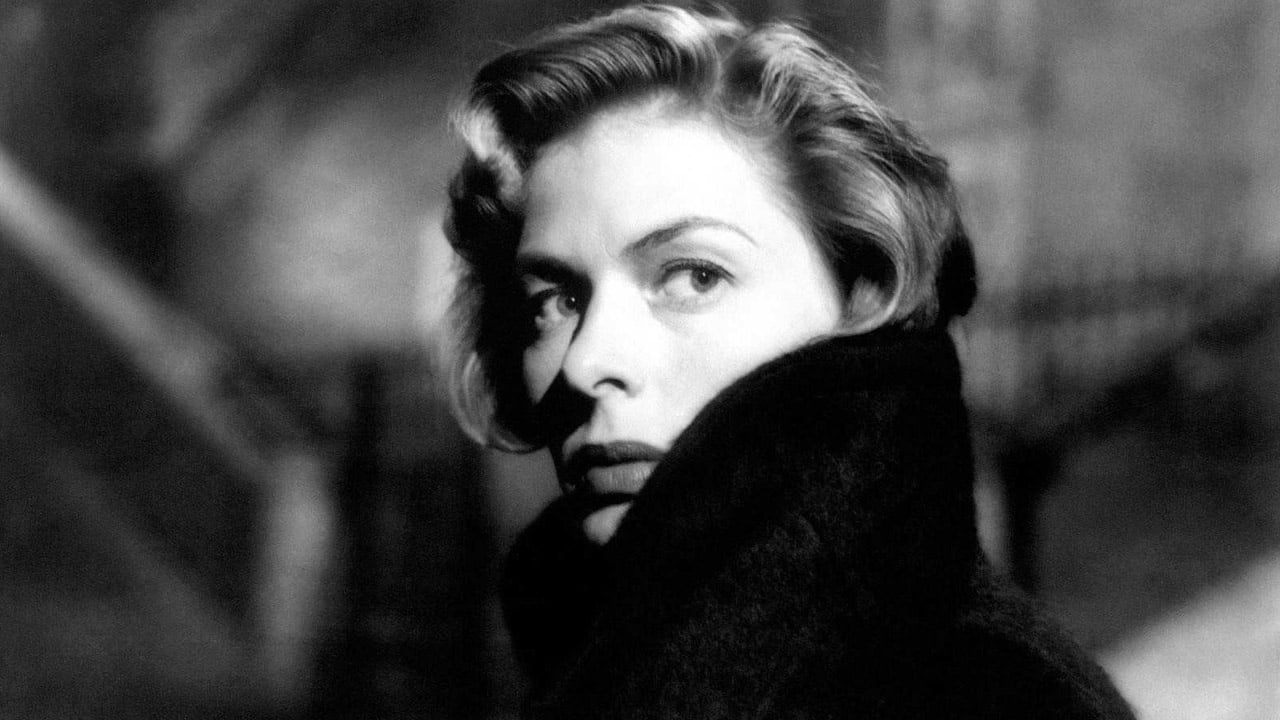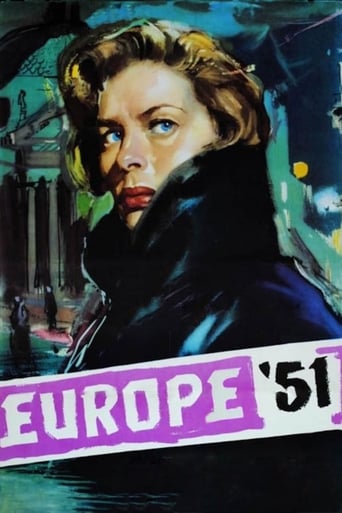

Excellent film dealing with the upper echelons of society that are unable to deal with a member of it who undergoes profound tragedy, leading her to live a life in total commitment to the impoverished.Ingrid Bergman gets this calling when her son dies, and it's first looked upon as having taken totally socialistic or Communistic beliefs.Alexander Knox plays her supposedly understanding husband, but soon relents when she is taken to an insane asylumGiulietta Masina is as always excellent as the woman taking care of 6 children, but still having her own immoral agenda.There are some scenes which remind me of Bergman's 1948 "Joan of Arc." I think the film was a great prelude to 1958's "The Inn of the 6th Happiness." Society was so fortunate to have Miss Bergman's appearance on screen.
... View MoreI attended a National Film Theatre screening as part of a Bergman season. The film was introduced as one that critical America found hard to bear, not least as the deserting Hollywood star Bergman had an affair with the director, Rossellini.I mention this as the film, which charts the resolution of personal crisis in the life of a bourgeois socialite, is a extremely open and even-handed critique of European social politics. Rossellini presents Irene Girard as having an epiphany in which she appears to be ideologically seduced by an activist of the left. This would have been particularly irritating to the HUAC who were experiencing a rash of films as backlash to their Hollywood blacklist of 1947 and would explain critical hostility to the film and Bergman personally.In fact, It becomes clear that Rossellini manages the extraordinary achievement of charting an ideological third way for Irene. She throws herself into her naive acts of charity somewhat haphazardly (though convincingly). She is subsequently appalled by the 'coal-face' realities of having to work in a factory. Her non-partisan political ineptitude is the reason she is eventually committed to an asylum.For me, Europa 51 is not simply the sad but noble tale of a grieving mother finding a unique way in which to sublimate her grief and guilt. Rossellini has concocted a sophisticated analogy for the poised, unresolvable social position of European society; an analogy that translates into the more digestible position of a single, normal, rational individual. It has the same, marvellous objectivity that one feels when watching the morally neutral Badlands, for example.There are a host of imperfections (not least in the tatty, French sub-titled print we were treated to!) in this film. Only so many can be put down to the rise of the (French) New Wave and the acting can be changeable. Bergman however is very fine, giving a multi-faceted performance that never veers off into incredibility even - especially - at the poignant, potentially confusing final scene/shot. Alexander Knox is also fine. A raw jewel of a movie. 8/10
... View MorePoor Ingrid suffered and suffered once she went off to Italy, tired of the Hollywood glamor treatment. First it was suffering the torments of a volcanic island in STROMBOLI, an arty failure that would have killed the career of a less resilient actress. And now it's EUROPA 51, another tedious exercise in soggy sentiment.Nor does the story do much for Alexander KNOX, in another thankless role as her long-suffering husband who tries to comfort her after the suicidal death of their young son. At least this one has better production values and a more coherent script than STROMBOLI.Bergman is still attractive here, but moving toward a more matronly appearance as a rich society woman. She's never able to cope over the sudden loss of her son, despite attempts by a kindly male friend. "Sometimes I think I'm going out of my mind," she tells her husband. A portentous statement in a film that is totally without humor or grace, but it does give us a sense of where the story is going.Bergman is soon motivated to help the poor in post-war Rome, but being a social worker with poor children doesn't improve her emotional health and from thereon the plot takes a turn for the worse.The film's overall effect is that it's not sufficiently interesting to make into a project for a major star like Bergman. The film loses pace midway through the story as Bergman becomes more and more distraught and her husband suspects that she's two-timing him. The story goes downhill from there after she nurses a street-walker through her terminal illness. The final thread of plot has her husband needing to place her for observation in a mental asylum.Ingrid suffers nobly through it all (over-compensating for the loss of her son) but it's no use. Not one of her best flicks, to put it mildly.Trivia note: If she wanted neo-realism with mental illness, she might have been better off accepting the lead in THE SNAKE PIT when it was offered to her by director Anatole Litvak!! It would have done more for her career than EUROPA 51.Summing up: Another bleak indiscretion of Rossellini and Bergman.
... View MoreMaybe it's the dubbing, or maybe it's the endless scenes of people crying, moaning or otherwise carrying on, but I found Europa '51 to be one of the most overwrought (and therefore annoying) films I've ever seen. The film starts out promisingly if familiarly, as mom Ingrid Bergman is too busy to spend time with her spoiled brat of a son (Sandro Franchina). Whilst mummy and daddy (bland Alexander Knox) entertain their guests at a dinner party, the youngster tries to kill himself, setting in motion a life changing series of events that find Bergman spending time showering compassion on the poor and needy. Spurred on by Communist newspaper editor Andrea (Ettore Giannini), she soon spends more time with the downtrodden than she does with her husband, who soon locks her up in an insane asylum for her troubles. Bergman plays the saint role to the hilt, echoing her 1948 role as Joan of Arc, and Rossellini does a fantastic job of lighting and filming her to best effect. Unfortunately, the script pounds its point home with ham-fisted subtlety, as Andrea and Mom take turns declaiming Marxist and Christian platitudes. By the final tear soaked scene, I had had more than my fill of these tiresome characters. A real step down for Rossellini as he stepped away from neo-realism and further embraced the mythical and mystical themes of 1950's Flowers of St. Francis.
... View More